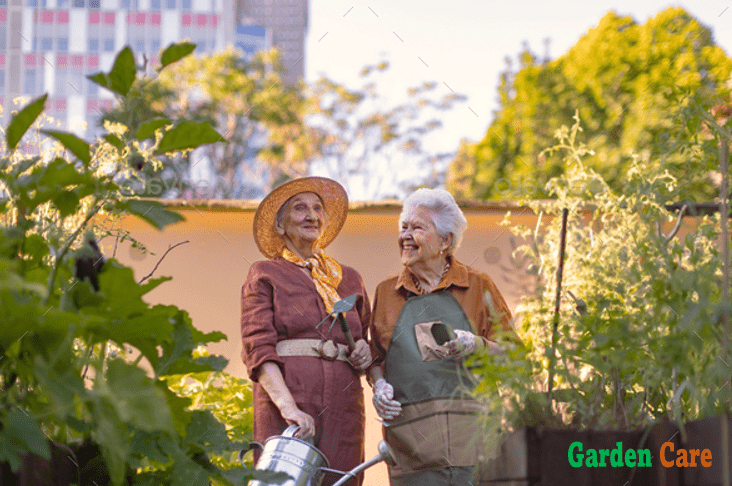Vegetable Garden Fertilizer Recommendations are dependent on the specific needs of the plants you are growing. Proper fertilizer application can enhance growth and yield.
[ez-toc]

The Importance Of Vegetable Garden Fertilization
Proper fertilization is key for a thriving vegetable garden. Using the right fertilizer and following recommended guidelines can promote healthy plant growth, increase yields, and improve soil quality. Utilizing organic and balanced fertilizers can ensure the overall success of your vegetable garden.
Maintaining a thriving vegetable garden requires more than just planting seeds and watering the plants. Adequate fertilization is crucial to ensure your vegetables receive the necessary nutrients for healthy growth. In this article, we will explore the significance of vegetable garden fertilization and the impact it has on plant growth.
Essential Nutrients For Healthy Plants
Vegetables require several essential nutrients to grow and develop properly. These nutrients can be categorized into two groups: macronutrients and micronutrients. Macronutrients, including nitrogen, phosphorus, and potassium, are required in larger quantities, while micronutrients like iron, zinc, and manganese are necessary in smaller amounts.
Nitrogen is responsible for leafy growth and vibrant green coloration in the plants. It is needed for photosynthesis and protein synthesis, both vital processes for healthy plant development.
Phosphorus promotes root development and assists in the production of flowers, fruits, and seeds. It aids in energy transfer and is crucial for overall plant growth and vigor.
Potassium, often referred to as potash, improves plant resilience to diseases and environmental stress. It plays a crucial role in the synthesis of proteins, starches, and sugars, resulting in better yield and quality of vegetables.
Impact Of Soil Health On Plant Growth
The health of the soil in your vegetable garden directly affects the growth and productivity of your plants. It serves as the foundation for nutrient absorption and root development. Healthy soil is rich in organic matter, adequately drained, and well-balanced in terms of pH level.
The presence of organic matter in the soil helps retain moisture and provides a steady source of nutrients for plants. It improves soil structure, allowing roots to penetrate easily and access essential nutrients. Regular fertilization helps maintain and replenish the organic matter content in the soil, ensuring the long-term health and productivity of your vegetable garden.
Proper soil drainage is crucial to prevent waterlogging, which can lead to root rot and other plant diseases. By enhancing soil structure and fertility through fertilization, you can create a favorable environment for plants to thrive.
Maintaining the appropriate pH level in your soil is also vital for optimal plant growth. Different vegetables have specific pH requirements, and fertilization can help adjust the soil pH, making it more suitable for the plants you intend to grow. This enables better nutrient absorption and utilization by the plants, leading to healthier and more productive crops.
Choosing The Right Fertilizer For Your Vegetable Garden
Find the perfect fertilizer for your vegetable garden with our top recommendations. Improve soil health and maximize plant growth with these carefully selected options.
When it comes to maintaining a successful vegetable garden, choosing the right fertilizer is crucial. Fertilizers provide essential nutrients that are necessary for healthy plant growth and development. With so many options available, it can be overwhelming to determine which fertilizer is best for your garden. This guide will help you understand the key factors to consider when selecting a fertilizer and make an informed decision for your vegetable garden.
Understanding Npk Ratio
One important aspect to consider when choosing a fertilizer is its NPK ratio. NPK stands for nitrogen, phosphorus, and potassium, which are three essential nutrients required by plants. Each fertilizer will have a specific NPK ratio, represented by three numbers separated by dashes or slashes, such as 10-10-10 or 5-10-5.
The first number represents the percentage of nitrogen (N) in the fertilizer, which is necessary for lush green foliage growth. The second number represents the percentage of phosphorus (P), which promotes root development and flower production. The third number represents the percentage of potassium (K), which enhances overall plant health, disease resistance, and fruit production.
For example, if you want to encourage fruiting in your vegetable garden, a fertilizer with a higher potassium (K) content, such as a 10-10-20 ratio, would be more suitable. On the other hand, if you are focusing on foliage growth, a fertilizer with a higher nitrogen (N) content, such as a 20-10-10 ratio, would be beneficial.
Organic Vs. Synthetic Fertilizers
Another crucial decision to make is whether to use organic or synthetic fertilizers. Organic fertilizers are derived from natural sources, such as compost, manure, or bone meal. They provide a slow-release of nutrients and improve soil health over time. Organic fertilizers are eco-friendly and sustainable, making them a popular choice for many gardeners.
On the other hand, synthetic fertilizers are manufactured artificially and provide a quick release of nutrients. They are chemically formulated to meet specific plant nutrient requirements. Synthetic fertilizers are typically more concentrated and may deliver faster results.
While both types have their advantages, it’s essential to consider your gardening goals and preferences. If you prioritize organic gardening methods and long-term soil health, organic fertilizers are the way to go. However, if you need immediate results or have specific nutrient deficiencies, synthetic fertilizers might be more suitable.
Application Techniques For Maximum Effectiveness
Fertilizing a vegetable garden with the right techniques is crucial for maximizing effectiveness and ensuring healthy, robust plants. Application methods such as top-dressing and side-dressing, as well as liquid fertilizer applications, play a significant role in providing the necessary nutrients for optimal growth. Understanding these techniques can help gardeners make informed decisions when it comes to fertilizing their vegetable gardens.
Top-dressing And Side-dressing
Top-dressing and side-dressing are effective techniques for applying fertilizer directly to the soil around vegetable plants. When top-dressing, spread the fertilizer evenly over the soil surface around the plants, avoiding direct contact with the stems. For side-dressing, create a furrow alongside the plants and apply the fertilizer, then gently cover it with soil. Both methods ensure that the nutrients reach the root zone of the plants, promoting healthy growth and development.
Liquid Fertilizer Applications
Liquid fertilizer applications provide a quick and efficient way to deliver nutrients directly to the plants’ roots. Using a watering can or a specialized applicator, carefully apply the liquid fertilizer to the base of the plants, ensuring even distribution. This method allows for rapid absorption of the nutrients, providing an immediate boost to the plants’ growth and overall health.
Seasonal Fertilization Guide For Different Vegetables
Proper fertilization is essential for the successful growth of vegetable plants in your garden. Different vegetables have unique nutrient requirements throughout their growth stages. In this seasonal fertilization guide, we will explore the specific fertilizer recommendations for various vegetables, ensuring healthy and bountiful harvests.
Spring Fertilization Recommendations
As the weather warms up and your vegetable garden comes to life, it’s crucial to provide the essential nutrients needed for healthy plant growth. Here are some spring fertilization recommendations for popular vegetables:
Tomatoes: Begin by adding a balanced fertilizer, such as a 10-10-10 formula or compost rich in organic matter, before transplanting tomato seedlings. Apply an additional dose of fertilizer after the first fruit set.
Lettuce: Incorporate a nitrogen-rich fertilizer, like a 5-1-1 formula, into the soil before planting lettuce seeds or seedlings. Nitrogen will support leafy growth.
Cucumbers: Before planting cucumber seeds or seedlings, apply a balanced fertilizer such as a 10-10-10 formula. Once the plants start to bloom, switch to a phosphorus-rich fertilizer like a 5-10-10 to promote fruit development.
Fertilizing Vegetables During Growth Stages
Throughout the growth stages of your vegetable plants, they require different nutrients to thrive and produce high-quality yields. Consider the following guidelines when fertilizing your vegetables during their specific growth stages:
| Vegetable | Growth Stage | Fertilizer Recommendation |
|---|---|---|
| Carrots | Early Growth | A high-phosphorus fertilizer like a 5-10-10 formula promotes root development. |
| Peppers | Flowering | Use a balanced fertilizer with higher potassium content, like a 10-10-20 formula, to encourage flower production and fruit set. |
| Broccoli | Head Formation | A nitrogen-rich fertilizer, such as a 5-1-1 formula, promotes lush foliage and sturdy head formation. |
Remember to follow the recommended application rates on the fertilizer packaging and monitor your plants’ response to ensure you’re providing adequate nutrients without over-fertilizing. Regularly check soil moisture levels and adjust watering as needed to prevent nutrient leaching.
By understanding the seasonal fertilizer requirements and growth stages of different vegetables, you can optimize your garden’s fertility and nurture healthy, productive plants that yield a bountiful harvest.
Troubleshooting Common Fertilization Issues
Having trouble with your vegetable garden fertilizer? Get expert advice on troubleshooting common fertilization issues and find the right fertilizer recommendations for a thriving garden.
Symptoms Of Nutrient Deficiencies
Preventing Overfertilization And Burn
Troubleshooting common fertilization issues is essential for maintaining a thriving vegetable garden. By understanding the symptoms of nutrient deficiencies and learning how to prevent overfertilization and burn, you can ensure your plants receive the correct amount of nutrients without causing harm. Let’s explore these common issues and discover effective solutions.
Symptoms Of Nutrient Deficiencies
Identifying the symptoms of nutrient deficiencies is crucial in addressing fertilization issues.
Below are some common signs to look out for:
1. Stunted growth: If your vegetable plants are not growing as expected, it may indicate a lack of essential nutrients. Keep an eye on the overall size and development of your plants.
2. Yellowing leaves: Yellowing leaves can indicate various nutrient deficiencies. Nitrogen deficiency often results in pale or yellow leaves, while magnesium deficiency causes yellowing between veins.
3. Leaf discoloration: Different nutrient deficiencies can cause specific leaf discoloration. For instance, a lack of iron often results in yellowing between leaf veins, while a manganese deficiency leads to yellow spots on the leaves.
4. Poor fruit or flower production: If your vegetable plants are not producing fruits or flowers as expected, it may be due to nutrient deficiencies. Lack of potassium, phosphorus, or calcium can hinder proper fruit and flower development.
To address nutrient deficiencies, consider testing your soil to determine which specific nutrients your plants may be lacking. Soil testing can provide valuable insights and help you choose the right fertilizer to rectify the deficiency.
Preventing Overfertilization And Burn
While nutrients are essential for plant growth, overfertilization can have detrimental effects. To prevent overfertilization and burn, follow these guidelines:
1. Read and follow instructions: Always carefully read the instructions provided by the fertilizer manufacturer. Apply the recommended amount of fertilizer based on your specific vegetable garden’s needs.
2. Avoid excessive nitrogen: Excessive nitrogen can lead to vigorous leafy growth but result in poor fruit development. Ensure you are not applying too much nitrogen-based fertilizer, particularly during the fruiting stage.
3. Time your fertilization: Timing is critical when it comes to fertilizer application. Apply fertilizers before planting or during the growing season following the recommended schedule. Avoid applying fertilizer too close to harvest to prevent nutrient burn.
4. Water properly: Proper watering techniques can help prevent nutrient burn. Water your plants thoroughly, allowing the soil to absorb the moisture. This helps prevent fertilizer from remaining on plant surfaces and causing burning.
By adhering to these recommendations, you can troubleshoot common fertilization issues in your vegetable garden. Identifying and addressing nutrient deficiencies while preventing overfertilization and burn will promote healthy growth and bountiful harvests.
Frequently Asked Questions On Vegetable Garden Fertilizer Recommendations
What Is The Best Fertilizer For Vegetable Gardens?
The best fertilizer for vegetable gardens is one with balanced nutrients like nitrogen, phosphorus, and potassium. Look for a fertilizer specifically formulated for vegetables and apply according to the instructions on the label for optimal growth and yield.
Is 10-10-10 Good For Vegetable Garden?
Yes, 10-10-10 fertilizer is good for a vegetable garden. It provides a balanced mix of nitrogen, phosphorus, and potassium, essential nutrients for healthy plant growth. Apply according to the instructions and consider other factors like soil type and plant needs for optimal results.
How Do I Apply 10-10-10 Fertilizer To My Vegetable Garden?
To apply 10-10-10 fertilizer to your vegetable garden, simply sprinkle it evenly around the plants. Use about 1 pound of fertilizer for every 100 square feet of garden area. Water the garden thoroughly after application to help the fertilizer soak into the soil.
When Should You Fertilize Your Vegetable Garden?
Fertilize your vegetable garden in early spring before planting, and then every 4-6 weeks during the growing season. Use a balanced fertilizer with nitrogen, phosphorus, and potassium. Follow the instructions on the fertilizer packaging and water the garden after applying.
Conclusion
Choosing the right fertilizer for your vegetable garden is crucial for ensuring healthy and bountiful crops. By understanding the specific needs of your plants and the nutrients they require, you can make informed decisions about the best fertilizer for your garden.
With the right approach, you can nurture a thriving vegetable garden and enjoy the delicious rewards it brings.


